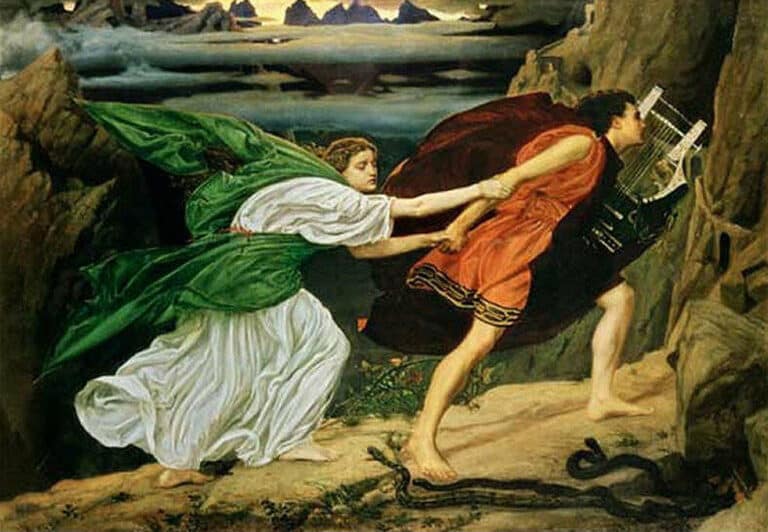One of the great mythological characters of ancient Olympus was Orpheus, the lover of music and poetry. He differs from the other gods for his delicacy and love for art, and it is not for less, he inherited from his parents all that talent that distinguished him, making him a being full of harmony as demonstrated by his melodies.
I want you to join me on the fascinating adventure of meeting this unique Greek figure. Here you will see who his parents were, what he did during his life and what was his most heroic feat to rescue his great love from a dark place. You dare?
Orpheus and his parents
Who could say that among so many powerful and violent gods, there would be others that filled with charm with their tenuous qualities. That was the case with Orpheus, for being son of Apollo, god of music and art, and from Calliope, a muse of epic poetry, eloquence and rhyme, she received that talent for the artistic with unquestionable perfection.
His father, Apollo, was a very complex god. He gathered so many talents that others did not have. He was in charge of beauty in all artistic forms, he also stood out for the art of healing, prophesying and shooting with the bow. His mother, for her part, was a majestic muse with a passion for poetry, she always carried a trumpet and an epic poem in her hands.
Therefore, Orpheus was born with an artistic nature worthy of his parents. He had a very eloquent musical ear, his melodic notes enveloped his viewers at a level of hypnotism that anyone would fall for when listening to them. He was fond of sweetening the environment with his artistic abilities.
The life of Orpheus
Orpheus, like other mythological characters, led an unusual life. He went around the world captivating every living being with his melodies and, thanks to her, he and his companions were able to get out of difficult situations.
Legend has it that once he went out with the Argonauts to very distant lands, in search of the Golden Fleece. It was a mysterious journey to an island known as Antemoesa, full of supernatural beings in the sea. They were beautiful mermaids, whose melodious voices captivated mortals to drag them with them to the bottom of the sea.
During the ship, the strange creatures began to sing to envelop the sailors. Orpheus in rescue took out his lyre and played musical notes so placid that he was able to neutralize the charm of the sirens, in turn, captivated both them and the wild beasts that guarded the Fleece.
Other momentous events in his life were the long trips to different lands to learn and be filled with wisdom. During your tours, taught about medicine, agriculture and even writing. It also explained what astrology, constellations and the movement of the stars were like.
The main characteristic of this character was his development with music, there was nothing that could resist it: rock, trees, streams and all kinds of living beings were astonished when listening to it, they were unable to interrupt while it sounded.
Myth of Orpheus and Eurydice, a love story
One of the most beautiful love stories was that of Orpheus and Eurydice, undoubtedly an example of loyalty and value to feelings. She was a very simple nymph, of singular beauty and sweet smile. It is said that she was from Thrace, right there Orpheus met her, who was immediately dazzled and decided to join her for life, under the blessing of Zeus.
One fine day, Eurydice goes for a walk in the forest looking for the company of the other nymphs, in her path she brings something terrible and unexpected. Aristeo, a nearby hunter, had fallen in love with her and wanted to kidnap her at that time. The desperate young woman fled into the undergrowth and it is there that a dangerous snake gave her a lethal bite. Eurydice dies quickly.
The heartbroken Orpheus suffered bitterly from the loss of his great love, until he made a decision that could only be made by someone deeply in love: travel to Hades to find his beloved wife and bring her back.
Orpheus and his journey to Hades
The trip to Hades was a very risky decision, however, Orpheus preferred to die in the attempt than to spend his life crying for his eternal love. He reached the river Styx where he was Charon in his boat carrying the dead to take them to Hades. While there he took out his lyre and began to play sonatas full of pain. They expressed the sorrow he felt in his heart. The moved boatman takes him to the other side.
Orpheus gets off the ship and meets the ferocious three-headed beast that guards the entrance to hell, however, she lets him pass by hearing its sad melody. Being Hades makes a pact with the queen of hell, Persephone. She accepts that she take Eurydice only if she does not look back at her during the entire trip until she leaves the place and receives the sun's rays, otherwise she would return there forever.
He accepts the proposal and quickly leaves the underworld with his nymph behind him, without the certainty that it was really her. They both headed back without being able to see each other. Already at the exit, Orpheus manages to cross the shadows of hell receiving the light of day, but in his desperation to see his love, he turns to look at her when she has not yet completely left. The result of that terrible mistake was to see her vanish before his eyes without being able to hold her by his side.
The death of Orpheus
This great tragedy was to repeat the feeling of having lost his wife, the Styx Lagoon became the scene where they said goodbye to two immense loves, this time, forever. Orpheus with no desire to live, wanders inconsolably accompanied only by his lyre. All he wanted was to die to see his beloved wife again.
His wishes came true when the Thracian Bacchantes wanted to seduce him but he did not give in. Although he ran through the forest to get away from them, they managed to catch up with him and killed him. Orpheus was finally able to return to Hades to reunite eternally with his Eurydice in a love story that will live forever. This shows how love can overcome any obstacle, and as long as it exists, not even death will be its end.





ALL THE MYTHS EXCELLENT, I AM VERY PLEASED TO KNOW EACH ONE OF THEM
I CONGRATULATE YOU!!!